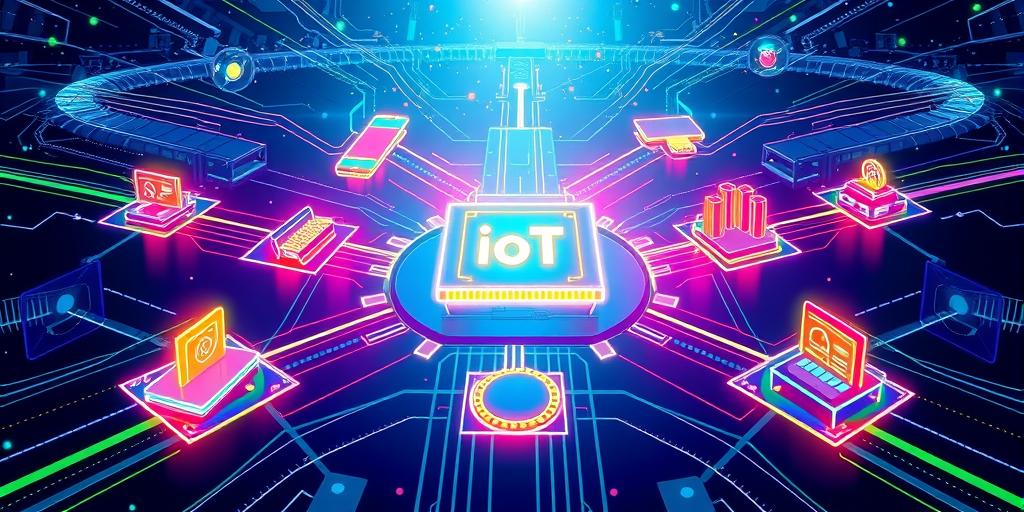Have you ever wondered how your smart devices communicate with each other and the internet? The magic behind the scenes often involves a crucial component called an IoT gateway. These unsung heroes of the connected world seamlessly bridge the gap between various devices and systems, making the internet of things (IoT) possible! But what exactly are they, and why are they so darn important? Let’s dive into the fascinating world of IoT gateways and uncover their vital role in our increasingly interconnected lives.
Decoding the Enigma: What is an IoT Gateway?
In simple terms, an IoT gateway is a device that acts as a translator between your smart devices and the cloud. Imagine it as a central hub, receiving and processing data from multiple sensors, actuators, and other IoT devices. It then securely transmits this information to the cloud or a local network for analysis, storage, and further processing. This clever little box ensures smooth communication, regardless of the device’s unique protocols and communication standards.
Key Functions of an IoT Gateway:
- Protocol Translation: IoT gateways can manage numerous communication protocols, making them versatile connectors. This includes the likes of MQTT, CoAP, and HTTP, among many others. This versatility is crucial in enabling communication across a diverse range of devices, each with its unique way of communicating.
- Data Aggregation and Preprocessing: Rather than transmitting raw data from numerous sources individually, an IoT gateway will consolidate and pre-process this information. This improves efficiency, reduces bandwidth consumption, and minimizes security vulnerabilities.
- Security Enhancement: These devices often incorporate advanced security features, such as encryption and authentication, to protect sensitive data from unauthorized access. This robust security is crucial for securing IoT networks, as many connected devices lack these advanced security measures on their own.
- Edge Computing Capabilities: Many advanced gateways offer edge computing capabilities. This means that some data processing can occur locally, on the gateway itself, reducing latency and dependence on cloud connectivity. This is particularly important in situations with limited or unreliable network connectivity.
Why are IoT Gateways Essential in Today’s Connected World?
In our increasingly interconnected world, IoT gateways are essential for a variety of reasons, making them an indispensable part of IoT infrastructure. Here are some of the most important ones:
Scalability and Interoperability:
IoT gateways provide the scalability to support a large number of devices. As more and more devices are integrated into an IoT network, gateways effortlessly handle the growing volume of data and ensure seamless interoperability, even with devices using different communication protocols. This ensures that your growing network of smart devices continues to communicate efficiently.
Enhanced Security Measures:
Security is paramount in the world of IoT. Gateways function as the first line of defense against cyber threats, acting as a barrier between potentially vulnerable devices and the outside world. This helps prevent attacks and protects sensitive data from falling into the wrong hands. The gateway acts as an essential security checkpoint, enhancing the security of the entire IoT network.
Cost Optimization and Efficient Resource Management:
Despite their initial investment, IoT gateways can help optimize costs in the long run. By aggregating data and performing pre-processing at the gateway level, these solutions reduce bandwidth usage and cloud storage costs. They also streamline data management, helping optimize resources effectively.
Real-time Data Analysis and Control:
Some IoT gateways offer real-time data analysis capabilities. They can perform data processing and deliver immediate insights to enhance decision-making processes, enabling real-time actions based on current data. This is particularly useful in applications requiring immediate responses, like industrial automation and environmental monitoring.
The Future of IoT Gateways: A Glimpse into Tomorrow
As the number of interconnected devices continues to increase exponentially, the role of IoT gateways is only set to grow more significant. Future developments will likely incorporate advanced analytics, AI integration, and more sophisticated security protocols, opening doors to unprecedented capabilities and applications. We can expect to see better integration with edge computing, as well as improved support for numerous communication protocols. The development of low-power wide-area network (LPWAN) gateways will enable wider adoption of IoT technology in areas where other technologies aren’t applicable.
Emerging Trends and Technologies:
- AI-powered gateways: Intelligent gateways that leverage artificial intelligence for improved data processing, enhanced security, and more efficient resource management.
- 5G and Edge Computing: Increased integration with 5G networks and edge computing to improve the processing and transmitting of data, enabling real-time insights in demanding applications.
- Advanced security protocols: The addition of advanced security methods to safeguard against evolving threats in IoT networks.
Ready to harness the power of IoT gateways and transform your business? Contact us today to learn how our solutions can help you achieve your goals!




